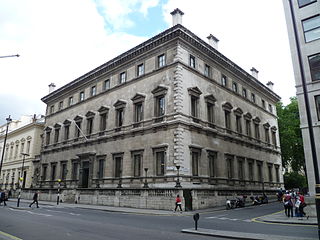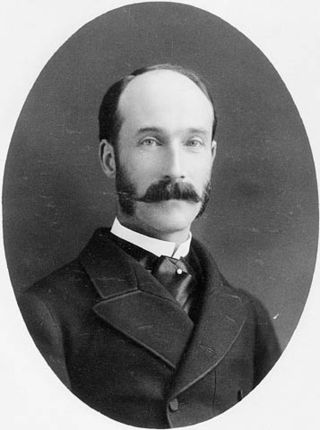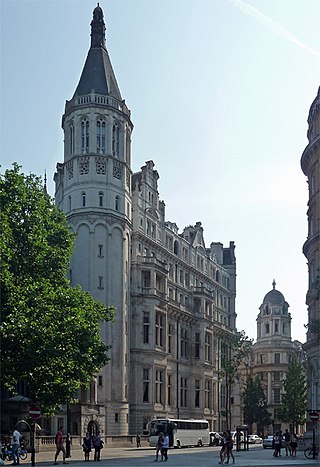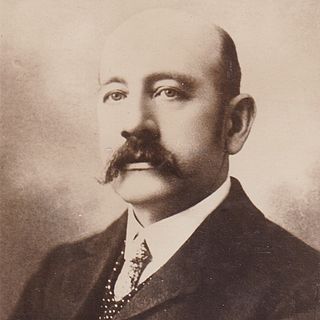See also
Grouped by societal associations, ordered by seniority | |||||
| Unionists, Tories, and/or Conser- vatives |
| ||||
| Whigs and/ or Liberals |
| ||||
| British Armed Forces |
| ||||
| Educa- tional background |
| ||||
| Arts and sciences |
| ||||
| City of London |
| ||||
| National connections |
| ||||
The Eighty Club was a political London gentlemen's club named after the year it was founded, 1880 (much like the later 1900 Club and 1920 Club). It was strictly aligned to the Liberal Party, with members having to pledge support to join. Somewhat dwarfed by mass-membership clubs like the National Liberal Club, it could only claim 400 members in 1890, and 600 by 1900. [1]
H. H. Asquith was the first secretary of the Eighty Club and David Lloyd George was sometime President. [2]
The Club closed in 1978, although the name was then adopted as the title of the Association of Liberal Democrat Lawyers' annual lecture series. [3]
The Liberal Unionist Party was a British political party that was formed in 1886 by a faction that broke away from the Liberal Party. Led by Lord Hartington and Joseph Chamberlain, the party established a political alliance with the Conservative Party in opposition to Irish Home Rule. The two parties formed the ten-year-long coalition Unionist Government 1895–1905 but kept separate political funds and their own party organisations until a complete merger between the Liberal Unionist and the Conservative parties was agreed to in May 1912.

The Reform Club is a private members' club, owned and controlled by its members, on the south side of Pall Mall in central London, England. As with all of London's original gentlemen's clubs, it had an all-male membership for decades, but it was one of the first all-male clubs to change its rules to include the admission of women on equal terms in 1981. Since its foundation in 1836, the Reform Club has been the traditional home for those committed to progressive political ideas, with its membership initially consisting of Radicals and Whigs. However, it is no longer associated with any particular political party, and it now serves a purely social function.

Henry Charles Keith Petty-Fitzmaurice, 5th Marquess of Lansdowne,, was a British statesman who served successively as Governor General of Canada, Viceroy of India, Secretary of State for War and Secretary of State for Foreign Affairs.

Thomas Denman, 3rd Baron Denman, was a British aristocrat and politician who served as the fifth Governor-General of Australia, in office from 1911 to 1914.

Ronald Craufurd Munro Ferguson, 1st Viscount Novar, was a British politician who served as the sixth Governor-General of Australia, in office from 1914 to 1920.

The Carlton Club is a private members' club in the St James's area of London, United Kingdom. It was the original home of the Conservative Party before the creation of Conservative Central Office. Membership of the club is by nomination and election only.

Edward Cardwell, 1st Viscount Cardwell, was a prominent British politician in the Peelite and Liberal parties during the middle of the 19th century. He is best remembered for his tenure as Secretary of State for War between 1868 and 1874 and, with William Ewart Gladstone's support, the introduction of the Cardwell Reforms. The goal was to centralise the power of the War Office, abolish purchase of officers' commissions, and to create reserve forces stationed in Britain by establishing short terms of service for enlisted men.

A gentlemen's club is a private social club of a type originally set up by men from Britain's upper classes in the 18th and succeeding centuries.

The National Liberal Club (NLC) is a London private members' club, open to both men and women. It was established by William Ewart Gladstone in 1882 to provide club facilities for Liberal Party campaigners among the newly enlarged electorate following the Third Reform Act in 1884, and was envisioned as a more accessible version of a traditional London club.

The Honourable Charles Herbert Mackintosh was a Canadian journalist and author, newspaper owner and editor, and politician. He served as mayor of Ottawa from 1879 to 1881, represented the City of Ottawa as a Liberal-Conservative Member of Parliament in the House of Commons of Canada from 1882 to 1887, and from 1890 to 1893, and served as Lieutenant Governor of the North-West Territories from 1893 to 1898, as it underwent a major transition toward responsible government.

The Cobden Club was a society and publishing imprint, based in London, run along the lines of a gentlemen's club of the Victorian era, but without permanent club premises of its own. Founded in 1866 by Thomas Bayley Potter for believers in Free Trade doctrine, it was named in honour of Richard Cobden, who had died the year before. Potter was honorary secretary of the Cobden Club from its foundation until his death in 1898.

Arthur Temple Lyttelton was an Anglican Bishop from the Lyttelton family. After studying at Eton College and Cambridge University, he was ordained as a priest in 1877, and was a curate at St Mary's in Reading. He later served as vicar in Eccles, before being appointed as the third Suffragan Bishop of Southampton. He gave and published a number of lectures relating to his faith, and was the Hulsean Lecturer in 1891. He was also one of eleven members of the Lyttelton family to play first-class cricket.

The Liberal Democrats are a political party in the United Kingdom, founded in 1988. The third-largest UK political party, they have 15 members of Parliament in the House of Commons, 84 members of the House of Lords, four Members of the Scottish Parliament, one member in the Welsh Senedd, and over 3,000 local council seats. The Liberal Democrat Conference formulates party policy.
The National Union was a short-lived political London gentlemen's club founded in 1887. It was aligned to the recently created Liberal Unionist party which had been created by the Home Rule issue. By 1890, it was reported by Whittakers Almanack to have around 1,200 members, but like the similar Unionist Club, it had difficulties establishing a membership base. Its history proved to be short, and it was disbanded before 1900.
The National Conservative Club was a short-lived political London gentlemen's club founded in 1886. It was aligned to the Conservative party, with members having to pledge support. It was launched as a rival to the mass-membership National Liberal Club of the opposing Liberal party, but proved highly unsuccessful. According to Whitaker's Almanack, it had 2,500 members in 1890, but at a third of the National Liberal Club's membership, this was less than expected, and the NCC closed before the end of the century.
The Palace Club was a short-lived political London gentlemen's club founded in 1882. It was aligned to the Conservative party, with members having to pledge support. Unlike many of the better-established clubs like the Carlton, or some of the new clubs like the Constitutional, it never acquired a sizable membership; according to Whittakers Almanack it had only 220 members in 1890, and 250 by 1900. It closed within a decade.

Sir James Bailey JP, DL, MP, was a British Conservative Party politician who served from 1895 to 1906 as Member of Parliament (MP) for Walworth in South London. He was also a successful hotel developer, most notably for establishing the Bailey's Hotel in Kensington, and the founder of a London gentlemen's club, the Constitutional Club. Baileys Irish Cream is named for the hotel that bears his name.

John Butler (1717–1802) was an English bishop and controversialist.

Sir Sidney Job Pocock was a British businessman, magistrate, writer, Liberal Party politician and an authority on prisons.